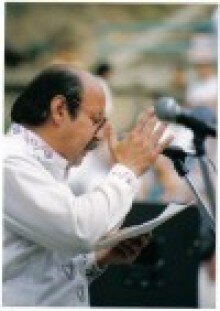
Born in Bogota, Henry Luque Muñoz graduated in sociology, gained a master’s degree in literature and was a university lecturer for many years. He lived for twelve years in Europe and Russia, where he studied the classics, which he translated into Spanish and about which he wrote several books. This long residence abroad was fundamental to the originality and the rich cultural references of his poetry, to which he also brought a surreal but disciplined imagination. He published nine books of poems and a dozen books of criticism and anthologies.
There is no doubt about the imaginative qualities of, for example, ‘Sara’, a love poem to his wife, Sara Gonzáles Hernández, with whom he translated, among other things, the very Russian tales of Gogol, perhaps the most original of the great Russian writers. This is what he writes about the loved one’s eyes:
Made of unreal elements, or secret,
your eyes are the entrance door to the labyrinth.
The poem continues to surprise us to the end. We ourselves are taken into a labyrinth, one that is both cultural and an image of devoted love. Perhaps the most unusual image of all is in the following lines:
Light is not in the origin,
nor in the subtle blinking of the hydroelectric sources,
but in the movement you display with your own shadow.
I used to make fun of Henry. I used to find it almost impossible and somewhat ridiculous that a poet should wake every morning at five, and, on an empty stomach, create such bizarre images until nine o’clock! Now I see that the images he created every morning were truly incredible. Images like “the subtle blinking of the hydroelectric sources”, for example, which surreally defies our normal conception of things. And this in a love poem?!
His poems are infinitely rich in such images. It is possible to read and re-read them without digesting and understanding them. Now that I have translated some of Henry's poems into English I feel I have finally understood his fine poetry. How wrong I was to make fun of him!
The poetry of Henry Luque Muñoz takes us, as on a magic carpet, through what for many of us are the far-away lands of Asia – India, China and Russia – and introduces us to fascinating historical characters, such as Ulugh Beg, grandson of Tamerlane who was the greatest astronomer of his time, murdered by his son perhaps because of his indifference to the exercise of power.
Superficially his poetry seems to be a flight from reality. It is not. On the contrary, reality is always present in his poems. In a direct way as when he sees the torn carcass of a cow, with its calf alive in its entrails, floating down the Ganges; but mostly in an indirect way. The poet is a contemporary observer of exotic landscapes and remote historical times, and an astute reader of great poets.
In any case, he was not naive. He wrote: “Poetry is a failure that gives life”, and he added:
“Chance . . . [enabled] a form of rigour, a way of intellectualizing language and reality. In the countryside, while I sketched some verses, with the sky for a roof, I briefly retired, and on returning I saw a column of ants moving in an orderly way over the text. I felt proud of being read by these laborious sisters, by these anonymous beings of industrious will. In their work, the ants carry on their backs only what is necessary, what is complete, never what is useless. Transposed to my work, verbosity was the risk, verbal economy the steady hand . . . The collective undertaking of the insects involved, also, a solidary sense. And an instinctive discipline.”
Bibliography
Poetry
Sol cuello cortado (Sun Cut Neck), Ed. Andes, Bogotá, 1973
Lo que puede la mirada (What the Gaze Can Do), Ed. Andes, Bogotá, Colección de Poesía ‘Música del Bosque’, 1977
Carta a la paloma de Picasso (Letter to Picasso’s Dove), Colección de Poesía ‘Música del Bosque, Bogotá, 1980
Libro de los caminos (1978-1988) (Book of the Roads), Colección Literaria 38, Fundación Simón y Lola Guberek, Ed. Lealón, 1991
Pólen de lejanía (Pollen of Remoteness), Bogotá, 1998, ISBN 958-683-057-8. Translated into Rumanian: Polen de departâre, Orfeo Univers, Bucarest, 2001, ISBN 973-34-0839-5
Arqueología del silencio, Ed. Opus Mágnum, Bogotá, 2002, ISBN 958-97034-4-5
Escrito con la garra del dragón (Written with the Claw of the Dragon), Universidad Nacional de Colombia, Colección Viernes de Poesía, N° 41, 2006, CDD 21 861.861 / 2006
Essays
Domínguez Camargo, la rebelión barroca, Instituto Colombiano de Cultura, Bogotá, 1976
Tras los clásicos rusos, Biographies of Pushkin, Gogol, Lermontov, Chekhov, Editorial Progreso, Moscow, 1986
Dos clásicos rusos – Saltikov-Shedrin-Turgueniev, Editorial Progreso, Moscow, 1988
Eduardo Castillo, a biography, Procultura, Bogotá, 1989, ISBN 958-9043-73-9
El poeta y su sombra, El Navegante Editores, Bogotá, 1991, ISBN 958-95253-1-8
El erotismo del cielo –Una introducción a la historia social de la literatura rusa, Manizales, Colombia, 1996, ISBN 968-6767-41-1
William Shakespeare, Editorial Panamericana, Bogotá, 2005
De los movimientos artísticos y literarios de Occidente a la poesía colombiana del siglo XX, Javegraf, Bogotá, 2004, ISBN 958-683-628-0
Anthologies and compilations
In Spanish
Narradores colombianos del siglo XIX, Biblioteca Básica Colombiana, Instituto Colombiano de Cultura, 1976
In Russian
Poesía colombiana Editorial Judoshestbennaia, Moscow, 1991, ISBN, 5-280-01724-8
In Ukranian
Refranes colombianos, 800 Colombian proverbs, Editorial Dniepro, Kiev, 1986
Links
In Spanish
Casa de Poesía Silva. Poems and short biobibliographical information
http://www.casadepoesiasilva.com/henryluque.htm
/>
Poéticas.Com: Essay about Henry Luque’s work and selected poems
http://www.poeticas.com.ar/directorio/Poetas_miembros/Henry_Luque_Munoz.html
/>
Poéticas.Com: Essay by Manuel Ruano about Luque’s work http://www.poeticas.com.ar/Biblioteca/Arqueologia_del_silencio/arqueoloframe.html
/>
CDArte: Dossier on Henry Luque
http://www.cdarte.org/revista_dossier01_hap.html
/>
Library Luis Ángel Arango. Essay by John Galán Casanova regarding the book Libro de los Caminos by Henry Luque Muñoz
http://www.lablaa.org/blaavirtual/publicacionesbanrep/boletin/boleti5/bol30/resena15.htm




